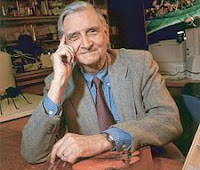Highly Miscellaneous
1. I've been meaning to do a shout-out post for the writer Sadie Stein who blogs at the Paris Review. She imparts that David Sedaris Effect. When you read her you go, hey, she's just talking about her daily life and the little stuff that happens and it's dryly very funny and even a bit profound, like when her husband took exception to her always singing along with the music in stores, and how it turned into a big thing. I can do that, you think. Maybe. At any rate, please read her. She's great. At once urbane and accessible.
2. There's a really good profile of the biologist E. O. Wilson running on PBS. Wilson made his career studying ants and then extrapolating out to humanity (and BTW ants are fascinating). He might have even coined the term biodiversity, and is known for developing the field of sociobiology. What is the role of evolved instinct in shaping society? That's the question. It seems to me that all human endeavor, even the highest forms such as art, sport, worship, gastronomy, science, etc., are elaborations, elevations, sublimations, redirections of instinct.
3. Finally saw the movie Whiplash, or at least the final three-quarters of it. Let's make one thing clear: The character of Fletcher is not a "tough love" teacher but a sadist and a psychopath. Yes, I liked how the drummer, Andrew, turns the table on Fletcher at the end, thus "winning" their psychological battle. But frankly the movie doesn't really seem to understand jazz at all. Looking around the web to investigate this point, I see lots on comments saying, Jesus, lighten up, it's just a movie. OK, I get it. But here's a great interview with Peter Erskine analyzing the film from the perspective of a master jazz drummer and teacher. I'll remark on a couple things. Conservatory jazz is way, way more creative, varied, and cooperative than depicted here. I mean, that chart of "Caravan" they keep playing is dull, dull, dull -- it sounds like a high school band. No group would ever play that at a big concert showcase, as they do in the film. And no one can determine tempo within just two beats, as Fletcher is shown doing here. A better movie would have Andrew walking out on Fletcher and the conservatory, moving downtown, wrestling with self-doubt, but then finding himself in a creative, collective environment, of the kind that exists all over NYC.
2. There's a really good profile of the biologist E. O. Wilson running on PBS. Wilson made his career studying ants and then extrapolating out to humanity (and BTW ants are fascinating). He might have even coined the term biodiversity, and is known for developing the field of sociobiology. What is the role of evolved instinct in shaping society? That's the question. It seems to me that all human endeavor, even the highest forms such as art, sport, worship, gastronomy, science, etc., are elaborations, elevations, sublimations, redirections of instinct.
3. Finally saw the movie Whiplash, or at least the final three-quarters of it. Let's make one thing clear: The character of Fletcher is not a "tough love" teacher but a sadist and a psychopath. Yes, I liked how the drummer, Andrew, turns the table on Fletcher at the end, thus "winning" their psychological battle. But frankly the movie doesn't really seem to understand jazz at all. Looking around the web to investigate this point, I see lots on comments saying, Jesus, lighten up, it's just a movie. OK, I get it. But here's a great interview with Peter Erskine analyzing the film from the perspective of a master jazz drummer and teacher. I'll remark on a couple things. Conservatory jazz is way, way more creative, varied, and cooperative than depicted here. I mean, that chart of "Caravan" they keep playing is dull, dull, dull -- it sounds like a high school band. No group would ever play that at a big concert showcase, as they do in the film. And no one can determine tempo within just two beats, as Fletcher is shown doing here. A better movie would have Andrew walking out on Fletcher and the conservatory, moving downtown, wrestling with self-doubt, but then finding himself in a creative, collective environment, of the kind that exists all over NYC.

Comments
Post a Comment